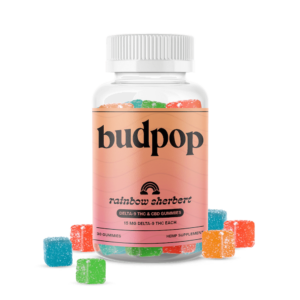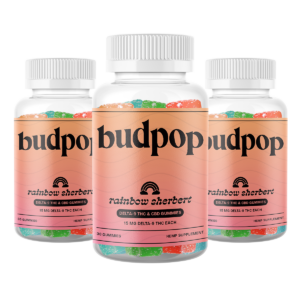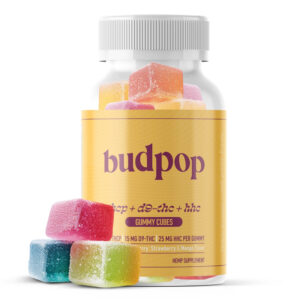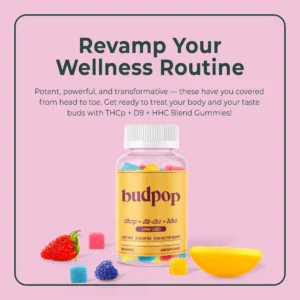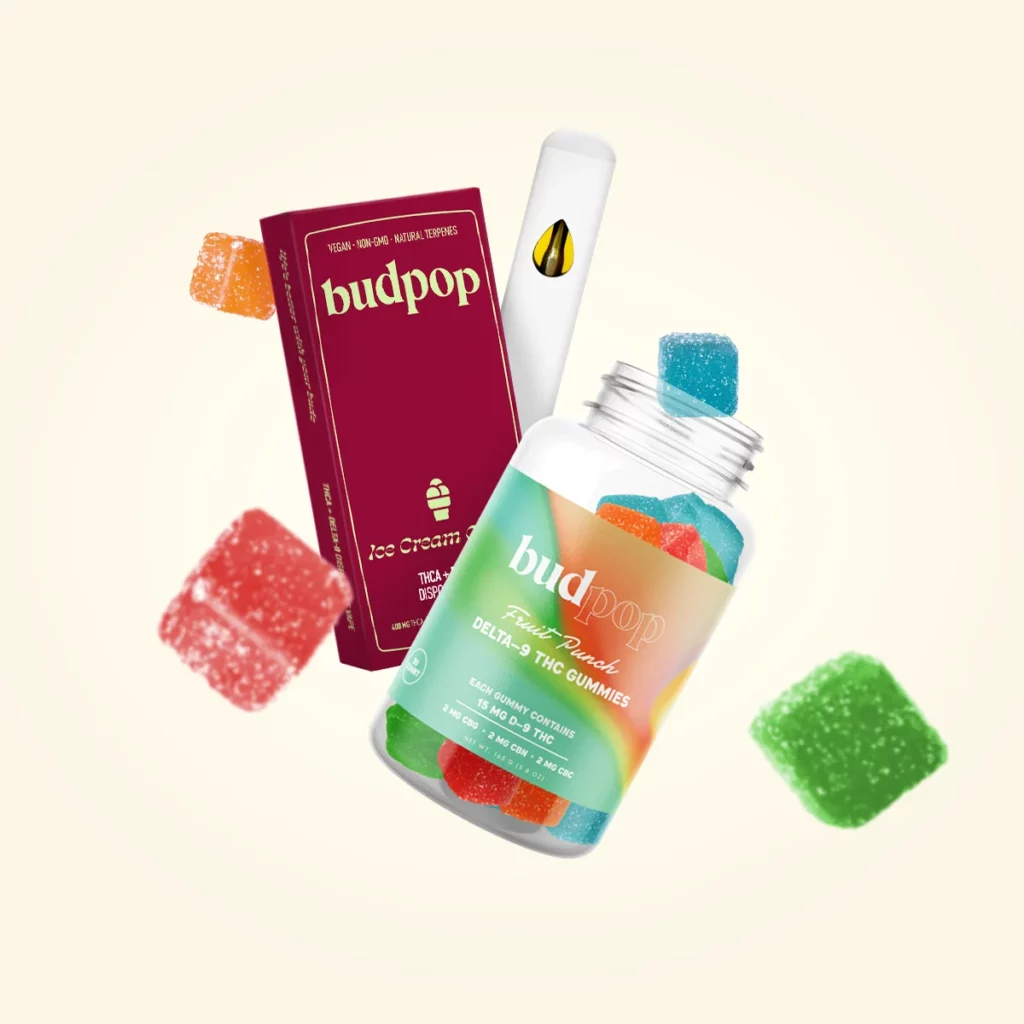The cannabis industry is growing in leaps and bounds. New products are released on the market all the time. And with that comes new discoveries of cannabinoids that are more powerful than the last. Enter THCP, a cannabinoid that’s reportedly 33 times (yes, thirty-three times!) more powerful than THC. Many consumers will compare THCP vs THC, and wonder, which is best for their needs.
The main difference between THCP vs THC is potency. Both produce euphoric effects, but THCP binds powerfully to your body’s cannabinoid receptors. It’s a stronger cannabinoid for people who want a more potent buzz that THC can’t provide. A potent cannabinoid is desirable, but it’s not for everyone. Keep reading as we take a look into THCP vs THC debate so you can determine which is best suited to your wellness goals. We’ll compare and contrast both cannabis plant compounds and unravel the differences between these two popular hemp derived cannabinoids.
What are THCP and THC?
THC and THCP are both natural compounds found in cannabis plants. THC (Delta 9 THC, D9 THC, Delta 9, or D9) is a natural cannabinoid present in all cannabis strains. THC is present in high concentrations in the marijuana plant, and low concentrations (0.3% or less) in the hemp plant.
However, THCP (Tetrahydrocannabiphorol, THCP, THC-p, or THC-P) is found in much lower concentrations. In fact, the concentration of this naturally occurring cannabinoid is so small that it’s almost undetectable. Therefore, the THCP you find in most products is laboratory synthesized.
To make sufficient amounts of THCP for consumer products, CBD (Cannabidiol) must first be extracted from legal hemp plants. CBD then undergoes a multi-step conversion process that turns it into THCP.
Delta 9 THC, on the other hand, is the most abundant cannabinoid in existing marijuana strains and one of several hemp-derived cannabinoids. Chemical processes are not required to make it more available to the masses. Most THC you find on the market is in its natural state. However, hemp-derived products must contain THC from hemp plants to be legally bought and sold. Similar to THCP’s synthesis process, sufficient amounts of THC can be generated by chemically manipulating CBD extracted from hemp.
Both THC and THCP provide euphoric effects and therapeutic benefits. However, THCP is stronger than THC. THCP forms a strong bond with the cannabinoid receptors in the endocannabinoid system “ECS” to produce powerful euphoria and effects in the body. With 33 times more binding efficiency than THC, THCP is one of the if not the most potent cannabinoid on Earth.
THCP vs THC: The Detailed Difference
Differences in Chemical Structure
THC and THCP have similar chemical structures and are both THC compounds or THC analogs. However, there is one critical difference. THCP’s chemical structure has a longer alkyl side chain than THC. Delta 9 THC, with a side chain of five carbon atoms, is more potent than other cannabinoids. However, it pales in comparison to THCP’s potency.
THCP has a seven carbon atoms in its side chain. This allows THCP to bind up to 33 times more efficiently to the cannabinoid receptors of your ECS. This strong bond is what makes THCP stronger than THC.
Interactions with Your Body’s Endocannabinoid System
At this point, you may ask, what are cannabinoid receptors anyway? Cannabinoid receptors are among the components of the endocannabinoid system “ECS”. The ECS is a network of receptors and chemical signals that run throughout our bodies and nervous system. It influences appetite, temperature, mood, immunity, and other essential bodily functions.
Cannabinoid receptors exist in the ECS. They include CB1 receptors which regulate hunger, alertness, temperature, and other mood-related functions. CB2 receptors work with the immune system and play a role in immunity, physical discomfort, and response to environmental infiltrates.
Both THC and THCP bind to these receptors to produce euphoria and therapeutic benefits. However, THCP forms a tighter bond. Therefore, it leads to more potent, longer-lasting results.
![THCP vs THC [Unraveling The Differences] endocannabinoid system micrograph](https://budpop.com/wp-content/uploads/2024/06/endocannabinoid-system-micrograph.jpg)
Dosage and Direction of Use
There are no hard and fast rules concerning how much THC or THCP to use. Cannabis compounds affect different people in different ways. Effects can vary depending on your metabolism, biology environment, and other factors.
The general rule is to start slow and see how the compound will affect you. it’s essential to start with low doses of THCP as the compound is a potent psychoactive cannabinoid. Increase to higher doses after determining how well you can handle your cannabis.
Start with a 1 mg dose. This may seem small, but it’s still more potent than other THC compounds. You may want to start with doses as low as 0.5 mg. Go even lower if you are consuming THCP for the first time. Always exercise caution with THCP. Regardless of the dose, THCP stands ready to deliver the most potent effects you’ve ever experienced from cannabis.
Forms of THC and THCP Available on the Market
Delta 9 THC may be easier to find than THCP. But both hemp-derived cannabinoids can be found in various forms and applications. They include the following.
Gummies
You can find traditional THC gummies and THCP gummies and other edible products. Edibles are ideal because they are pre-dosed, delicious, and discreet. These products take a long time to hit, usually 45-60 minutes. But when they hit, they hit hard. Go slow when consuming edibles.
Vapes
Both THCP and THC disposable Vape are discreet. They come as either all-in-one disposables or as 510-thread vape cartridges for use with batteries. Vapes don’t produce smoke. Instead, they produce vapor. This allows for discreet consumption at home or on the go.
Tinctures
THC and THCP tinctures provide a versatile way to benefit from these cannabinoids. Add drops to your favorite drink or foods, consume them directly or take them sublingually. The sublingual application provides quicker onset of effects.
Flower
Hemp flower can contain various cannabinoids including Delta 9 THC and THCP in very small amounts. Hemp only contains 0.3% or less THC, so it’s not really a good option if you’re looking for THC.
The alternative is marijuana, which is federally illegal and labelled as a controlled substance. However, the plant may be legal in a number of states for medical and recreational use.
THCP flower is hemp flower coated in a thin layer of THCP distillate and is federally legal as long as it contains 0.3% or less THC. You can smoke flower in joints, bowls, bongs, and dry herb vapes.
Topicals
Topicals are typically applied to the skin to relieve physical discomfort. They provide relief without psychoactive effects. There several THC-infused topicals on the market. However, THCP products for use as topicals are hard to come by. The novelty of THCP products lies in the euphoria they produce. You won’t feel much, if anything, if applying it topically as THCP does not enter your bloodstream.
Effects and Benefits of Traditional THC and THCP
Psychoactive Effects and User Experience
Both Delta 9 THC and THC-P produce psychoactive effects. Some people enjoy these effects as they can promote euphoria and creativity. However, they are not suitable for everyone in every circumstance. If you want to enjoy traditional THC or THC-P without a pronounced high, use products that are mixed with high levels of CBD to help counteract their effects.
Medical Benefits
Cannabis research is still ongoing, so there is no definitive answer. However, consumers share anecdotal reports of THC and THC-P’s efficacy. Hemp derived cannabinoids like Delta 9 THC and THC-P interact with CB2 cannabinoid receptors which play a role in immunity. They may provide relief from physical discomfort and response to environmental irritants. They can also reduce upset stomach and help with issues related to rest and sleep.
Potential Therapeutic Benefits
Delta 9 THC and THC-P products offer several potential therapeutic benefits. They interact with CB1 receptors which are linked to neurotransmitter systems. The interactions may help some people deal with mental health issues.
Synergistic Effects
Synergistic effects refer to how THC-P and THC interact with other cannabis compounds. They may be combined with other cannabinoids to produce an entourage effect. Many people find that when cannabinoids are combined, they enhance each other’s potency and produce more effective results.
Added cannabinoids can also change the overall effects. For example, if you mix THC-P and THC with the non-psychoactive compound CBD, the product will provide a mellower effect. CBG (Cannabigerol), another non-euphoric hemp plant cannabinoid, may enhance a product’s holistic effects, while CBN (Cannabinol) is ideal for relaxation.
Consumer Products
Several consumer products on the market contain THC-P, THC, or both. You can choose from vapes, flower, tinctures, topicals, edibles, and more. Choose the one that is best suited to your needs.
Consider that the consumption method will change how THC-P or traditional THC affects you. It can change how long it takes the product to hit, the potency, and how long the product lasts. Weigh the various factors and choose your products wisely.
Can You Detect THC and THCP in a Drug Test?
Yes, you can detect THC and THCP in a drug test. Standard drug tests detect the presence of THC. Like multiple THC analogs, THCP shares a similar chemical structure to a THC compound, which can lead to a false positive in a drug test. If you are frequently subjected to drug testing or know that you have one performed, cease use of all THC and THCP products immediately.
Availability of THCP and THC
There are several THC and THCP products available on the cannabis market. However, THC tends to be easier to find. As a newly discovered cannabinoid, THCP is slowly gaining popularity, but it still falls behind traditional THC. It has not been as well tested. Some manufacturers have yet to include it in their products.
Additionally, THCP is not as plentiful in the cannabis plant. It is often available as a lab-made synthetic cannabinoid. This also affects its availability.
THCP products may be difficult to find, but Budpop has a wide selection. We offer various THCP and Delta 9 THC products, including vapes and gummies. We are a trusted provider in this evolving cannabis market. We offer lab testing, fast and friendly service, and a satisfaction guarantee.
Legal Status of THCP and THC
Legal status is another consideration that affects the availability of both THC and THCP. If the products are not legal in your state, you may have difficulty accessing them.
Legality depends on the cannabis plant compounds come from. Hemp-derived cannabinoids share a federally legal status as long as they do not contain more than 0.3% THC. Marijuana-derived THC and THCP products are federally illegal. But they may be available for medical or recreational use in certain states.
As of the this writing, June 7, 2024, THC and THCP legal in the following states:
- Alabama: Conditionally legal (THC products are legal in Alabama if they contain 0.3% THC or less.)
- Alaska: Fully legal
- Arizona: Fully legal
- Arkansas: Conditionally legal (THC content can’t exceed 0.3%.)
- California: Fully legal
- Colorado: Fully legal
- Connecticut: Fully legal
- Delaware: Conditionally legal (THC content can’t exceed 0.3%.)
- District of Columbia: Fully legal
- Georgia: Conditionally legal (Products must contain equal amounts of THC and CBD.)
- Illinois: Fully legal
- Indiana: Conditionally legal (THC content can’t exceed 0.3%.)
- Iowa: Conditionally legal (THC content can’t exceed 0.3%, legal with a medical license only.)
- Kentucky: Conditionally legal
- Maine: Fully legal
- Massachusetts: Fully legal
- Michigan: Fully legal
- Missouri: Conditionally legal (THC content can’t exceed 0.3%. Legal with a medical license only.)
- Montana: Fully legal
- Nevada: Fully legal
- New Jersey: Fully legal
- New York: Fully legal
- Oregon: Fully legal
- Pennsylvania: Conditionally legal ( THC content can’t exceed 0.3%, legal with a medical license for specific conditions.)
- Rhode Island: Conditionally legal (THC content can’t exceed 0.3%, legal with a medical license only.)
- South Carolina: Conditionally legal (THC content can’t exceed 0.9%.)
- Tennessee: Conditionally legal (THC content can’t exceed 0.9%.)
- Texas: Conditionally legal (THC content can’t exceed 0.1% for patients with qualifying conditions.)
- Vermont: Fully legal
- Washington: Fully legal
![THCP vs THC [Unraveling The Differences] legal cannabis against american flag](https://budpop.com/wp-content/uploads/2024/05/legal-cannabis-against-american-flag.jpg)
Final Thoughts – THCP vs THC
THCP and THC are two popular products in today’s cannabis market. The confusion between the THCP definition and THC meaning often arises due to their similar names but differing chemical structures and effects. Both are considered a psychoactive cannabinoid. They offer various therapeutic effects as well. The main difference between THC and THCP is THCP’s heightened potency. Its chemical structure allows it to bind tightly to endocannabinoid receptors for a pronounced effect.
THCP potency can be up to 33 times stronger than THC. Start with lower doses when using THCP products. Various products exist to satisfy your THCp and THC needs. Ultimately, which cannabinoid is better Curious to try THC-P and THC products? Start your cannabis journey by heading to our shop and get your hands on the best, most reliable products the cannabis industry has to offer.
![THCP vs THC [Unraveling The Differences] thcp-thc-gummies-shop-now](https://budpop.com/wp-content/uploads/2024/06/9-1-1024x576.webp)
![THCP vs THC [Unraveling The Differences] hhc d9 thcp gummies](https://budpop.com/wp-content/uploads/2024/05/hhc-vs-delta-8-04-1024x1024.jpg)
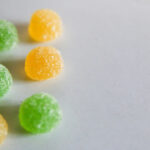
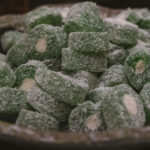


![How Long Do Shrooms Take To Kick In? [Discover The 4 Phases Of A Trip] How Long Do Shrooms Take To Kick In? [Discover The 4 Phases Of A Trip] | BudPop](https://budpop.com/wp-content/uploads/2025/05/How-long-do-shrooms-take-to-kick-in-150x150.jpg)

